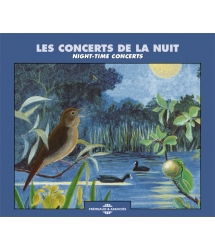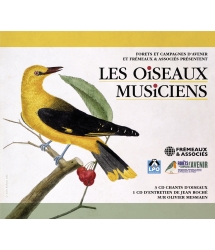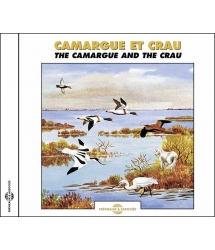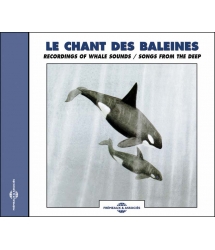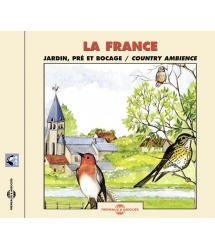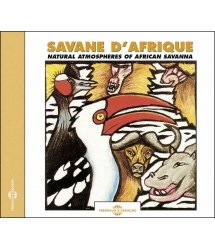- Our Catalog
- Philosophy
- Philosophers of the 20th century and today
- History of Philosophy (PUF)
- Counter-History and Brief Encyclopedia by Michel Onfray
- The philosophical work explained by Luc Ferry
- Ancient thought
- Thinkers of yesterday as seen by the philosophers of today
- Historical philosophical texts interpreted by great actors
- History
- Books (in French)
- Social science
- Historical words
- Audiobooks & Literature
- Our Catalog
- Jazz
- Blues
- Rock - Country - Cajun
- French song
- World music
- Africa
- France
- Québec / Canada
- Hawaï
- West Indies
- Caribbean
- Cuba & Afro-cubain
- Mexico
- South America
- Tango
- Brazil
- Tzigane / Gypsy
- Fado / Portugal
- Flamenco / Spain
- Yiddish / Israel
- China
- Tibet / Nepal
- Asia
- Indian Ocean / Madagascar
- Japan
- Indonesia
- Oceania
- India
- Bangladesh
- USSR / Communist songs
- World music / Miscellaneous
- Classical music
- Composers - Movie Soundtracks
- Sounds of nature
- Our Catalog
- Youth
- Philosophy
- News
- How to order ?
- Receive the catalog
- Manifesto
- Dictionnary











- Our Catalog
- Philosophy
- Philosophers of the 20th century and today
- History of Philosophy (PUF)
- Counter-History and Brief Encyclopedia by Michel Onfray
- The philosophical work explained by Luc Ferry
- Ancient thought
- Thinkers of yesterday as seen by the philosophers of today
- Historical philosophical texts interpreted by great actors
- History
- Books (in French)
- Social science
- Historical words
- Audiobooks & Literature
- Our Catalog
- Jazz
- Blues
- Rock - Country - Cajun
- French song
- World music
- Africa
- France
- Québec / Canada
- Hawaï
- West Indies
- Caribbean
- Cuba & Afro-cubain
- Mexico
- South America
- Tango
- Brazil
- Tzigane / Gypsy
- Fado / Portugal
- Flamenco / Spain
- Yiddish / Israel
- China
- Tibet / Nepal
- Asia
- Indian Ocean / Madagascar
- Japan
- Indonesia
- Oceania
- India
- Bangladesh
- USSR / Communist songs
- World music / Miscellaneous
- Classical music
- Composers - Movie Soundtracks
- Sounds of nature
- Our Catalog
- Youth
- Philosophy
- News
- How to order ?
- Receive the catalog
- Manifesto
- Dictionnary
NOCTURNAL CONCERTS OF THE WORLD
BERNARD FORT
Ref.: FA639
EAN : 3661585024873
Artistic Direction : BERNARD FORT
Label : Frémeaux & Associés
Total duration of the pack : 1 hours 13 minutes
Nbre. CD : 1
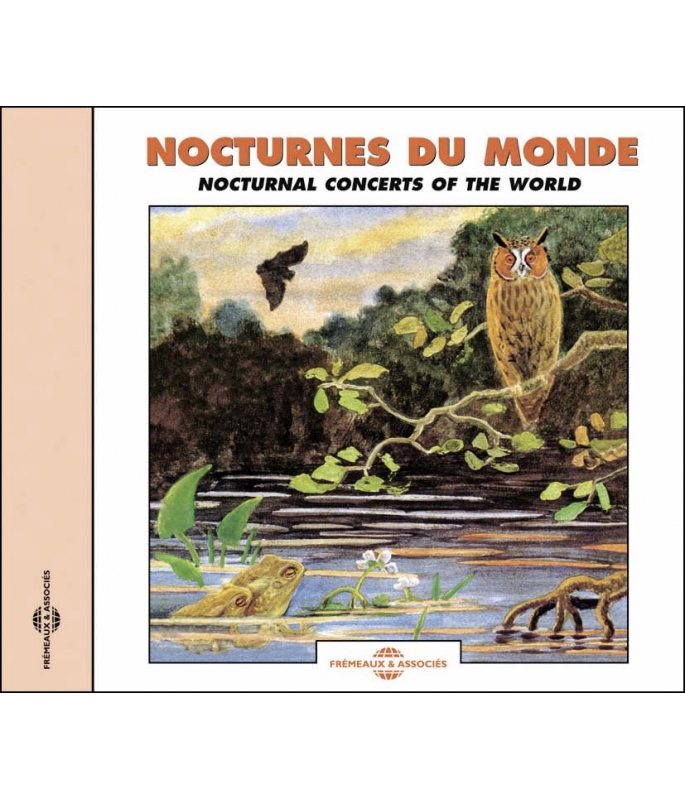
NOCTURNAL CONCERTS OF THE WORLD
NOCTURNAL CONCERTS OF THE WORLD
“On this CD the listener can hear four long natural concerts recorded at night in stereo, in different parts of the world. Bernard Fort, musician-composer, allows a place for time in these recordings, letting the listener appreciate the beauty of nocturnal calm.” Patrick Frémeaux

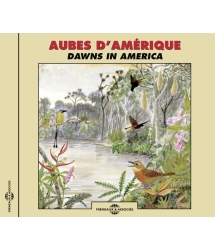
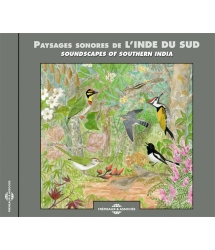
-
PisteTitleMain artistAutorDurationRegistered in
-
1Nocturne Provencal (Nocturnal Provence)Bernard FortBernard Fort00:31:062007
-
2Nocturne au Bord de l'Etang (A Nocturnal Lakeside)Bernard FortBernard Fort00:12:082007
-
3Nocturne dans le Delta du Danube (The Danube Delta by Night)Bernard FortBernard Fort00:19:272007
-
4Nocturne Africain (Nocturnal Africa)Bernard FortBernard Fort00:10:552007
Nocturnes du monde
Nocturnes du monde
Nocturnal concerts of the World
Introduction
Les levers du jour offrent à l’auditeur des concerts d’oiseaux aussi merveilleux que brefs. De même, les crépuscules sont fugitifs et leur musique semble accompagner cette bascule de la lumière du soir vers la nuit. Les nocturnes, en revanche, se présentent à nous comme des paysages sonores calmes, plans, sans apparentes ruptures. Des états dont la lente évolution se fait dans un temps étiré : le temps de la nuit. Les nocturnes de printemps ou d’été laissent peu d’espace aux oiseaux - rapaces nocturnes, rousserolles, rossignols - mais ils sont surtout le domaine des insectes et, bien sûr, des crapauds et grenouilles qui chantent en immenses chœurs. Enregistrés dans différents pays, sous diverses latitudes, ces nocturnes illustrent les grouillements nocturnes de la vie alors que la nature semble en sommeil.
1. Nocturne Provençal 31’00”
(St-Rémy-de-Provence, août 1997)
A la tombée de la nuit, vacarme des Cigales “Cancan” alors que l’obscurité tombe sur une pinède. L’orage gronde au loin et fait résonner les reliefs des Alpilles, il y a peu de vent et la pluie tarde à venir. Au second plan, les chants du Dectique à front blanc et du Grillon des champs. Enfin, une averse intense et de courte durée laisse la place au chant des Alytes avant que l’espace se recharge à nouveau des stridulations de la Grande Sauterelle verte et du Grillon d’Italie qui terminent le concert.
2. Nocturne au bord d’un étang 12’02”
(Dombes, juin 1996)
Vers 1 heure du matin, par une nuit sans lune, seule la profondeur des espaces acoustiques révèle la surface de l’étang. On entend au premier plan les Grenouilles vertes puis les Foulques Macroules et, au second plan, une Phragmitte des joncs sur un buisson et un Grillon des champs. Le paysage est fragile, calme, troublé de temps en temps par les chœurs de Grenouilles vertes. En fin de plage, un jeune Hibou moyen-duc perché dans un arbre appelle ses parents et des Canards colverts s’ébattent et crient quelques instants, sur fond de stridulations de la Grande Sauterelle verte.
3. Nocturne dans le Delta du Danube 19’21”
(mai 1997)
Au printemps, de jour comme de nuit, le Delta du Danube résonne du chant de millions d’amphibiens. En forêt, le long des canaux, dans les roselières comme dans les champs cultivés à l’entour des habitations, les diverses espèces se font entendre simultanément et créent une nappe sonore permanente à laquelle il est difficile d’échapper. Au début, c’est un concert de Crapauds sonneurs à ventre de feu et de Rainettes vertes. Puis, viennent les chants suraigus du Grillon des marais et du Conocéphale gracieux, et celui, fort et rauque, de la Rousserole Turdoïde. Nous sommes ici non loin du fleuve dans une prairie partiellement inondée, parsemée de quelques buissons de tamaris et de grands chênes. La Grenouille rieuse puis la Grenouille de Lessona se joignent au concert qui se termine avec les trilles douces du Crapaud vert. De temps en temps, les cloches d’un troupeau, ainsi que des chiens au loin attestent de la proximité du village de Crisan au centre du Delta.
4. Nocturne Africain 10’55”
(Kenya, août 1997)
Les nombreuses pluies d’été alimentent les cours d’eau et les lacs à proximité des camps à la lisière des grandes réserves fauniques. Ici, comme partout où l’eau est présente, la nuit appartient aux batraciens. Le début de cette plage nous fait entendre des chants d’insectes puis deux espèces d’amphibiens enregistrées au pied du Kilimanjaro dans le parc national d’Amboseli, dont Bufo carens ; ses notes graves semblent rebondir. La suite enregistrée à l’abri d’un petit pont de bois sous une pluie battante nous transporte à Massaï-Mara, à la limite de la Tanzanie : les notes de nombreuses petites grenouilles évoquent celles de ces xylophones de pierre africains que l’on nomme précisément lithophones.
Durée totale du CD : 73 minutes 39 secondes.
Bernard FORT / Octobre 1997
© 1997 SITTELLE – 2008 FRÉMEAUX & ASSOCIÉS
english notes
Introduction
Sunrise offers the listener marvellous, but all to short, concerts of bird song. Likewise, evenings are brief and their sounds appear to acompany twilight into darkness. Nights, on the otherhand, appear to us as calm, flat, sound landscapes without any apparent disturbance. A state in which changes occur slowly over an extended period ; the peace of the night. Nocturnal concerts in spring and summer leave little place for birds - owls, reed warblers, nightingales - but belong more to insects and especially, of course, toads and frogs that often sing in immense choruses. Recorded in different countries, and at different latitudes, these nocturnal concerts illustrate the nightly gatherings of animals that occur when most of the natural world appears to be sleeping.
1. Nocturnal Provence 31’00”
(St-Rémy-de-Provence, August 1997)
At dusk, the “Cancan” cicadas make a din as darkness falls over the pinewood. The thunder claps in the distance, echoing in the hills of the Alpilles, there is little wind so the rain is a long time in coming. In the background are the songs of Decticus albifrons and Field Crickets. Towards the end a quick downpour gives place to the songs of Midwife Toads before the air is once again taken up by strident song, this time of the Great Green Bush-cricket and the Italian Cricket.
2. A nocturnal lakeside 12’02”
(Dombes, June 1996)
Close to one o’clock in the morning, on a moonless night, the space occupied by sounds reveals the extent of the lake’s surface. In the foreground are Edible Frogs and then Coot, in the background a Sedge Warbler perched on a bush and a Field Cricket. The atmosphere is fragile, calm, upset from time to time by the chorus of Edible Frogs. At the end of the track a young Long-eared Owl perched in a tree calls its parents, and some Mallard splash about and call for a few moments, in the backgrounds are the stridulations of the Great Green Bush-cricket.
3. The Danube Delta by night 19’21”
(May 1997)
In the spring, by day as by night, the Danube Delta resounds to the song of millions of amphibians. In forest, along canals, in reedbeds, just as in cultivated fields around houses, the different species make themselves heard simultaneously whilst creating a permanent background sound from which it’s hard to escape. At the beginning, there’s a concert of Fire-bellied Toads and European Tree Frogs. Then comes the very high-pitched songs of two cricket species. Pteronemobius heydenii and Ruspolia nitidula and that of the loud and raucous Great Reed Warbler. We are now close to the river in a partially flooded meadow, dotted with a few tamarisks and large oaks. The Marsh Frog, then the Pool Frog join in the concert that ends with the soft trills of a Green Toad. From time to time the sound of a herd of cows, some with bells, and distant dogs reminds us that we’re close to a village, in this case Crisan in the heart of the Delta.
4. Nocturnal Africa 10’55”
(Kenya, August 1997)
The numerous summer showers have filled the streams and lakes near the camp sites on the perimiters of the large wildlife reserves. Here, as elsewhere where there is water, night-time belongs to the amphibians. At the start of this track we can hear insects and two species of amphibians recorded at the foot of Kilimanjaro, in the Amboseli National Park, including the rebounding deep notes of Bufo carens. Then follows a recording made during a downpour, under the shelter of a small wooden bridge, in the Masai-Mara Park near the Tanzanian border ; the notes of numerous small frogs are reminiscent of those made by African stone xylophones, more aptly called lithophones.
Total playing time of this CD : 73 minutes, 39 seconds (73’39”).
Bernard FORT / October 1997
Translated in English by Tony WILLIAMS
© 1997 SITTELLE – 2008 FRÉMEAUX & ASSOCIÉS
CD Nocturnes du monde © Frémeaux & Associés / Droits audio : Frémeaux & Associés - La Librairie Sonore (Producteur initial : Sittelle, Pithys, Collection Allain Bougrain Dubourg ou Ceba) / Ecouter les chants d'oiseaux sur CD : Sons et ambiances naturelles des écosystèmes - Stéreo and digital recording of the natural landscape sound. Natural sound sceneries of écosystems, Voices of the Wild Life. Les droits de cet enregistrement sont protégés par la loi. Pour toute exploitation d’illustration sonore sur CD, DVD, CD-Rom, Télévision, Cinéma, Sites internet, scénographies (théâtre, musées…), l’autorisation et un devis gratuit peuvent être obtenus auprès de Frémeaux & Associés – fax : +33 (0)1 43.65.24.22 info@fremeaux.com
